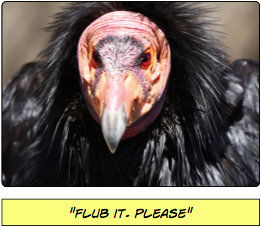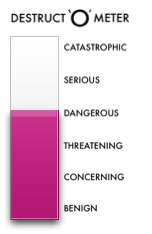1. The Sack.
2. The Magpie.
3. The Deer in Headlights.
4. The Hungry Vulture.
5. The Premature Solutioner.
6. The Terrier.
7. The Wanderer.
8. The Anticipator.
9. The Reluctant Puppet
Welcome to part four of my series on destructive project management behaviours. Since this series began, I’ve tried to effectively cover project managers who can’t delegate properly (Sacks), project managers with extremely limited attention spans (Magpies), and project managers who can’t make decisions (Deer).
Using the “Destruct-O-Meter” scale, I’ve rated each one with a subjective scale that I think represents the amount of damage these behaviours do to a project under the control of the perpetrator.
Today, I give you…
4. The Hungry Vulture.
Vultures (the actual birds) aren’t very well-liked. We see them when we drive down country roads, perched near the dying, and often have to overcome an urge to throw things at them. This is because nobody likes a carrion-feeder. They wait patiently for their victim to die (rather than either offering a helping hand, or a clean kill), and when the victim exhales its last breath, the vulture pulls them apart and eats their remains. They know their prey isn’t going anywhere–at least the corpse isn’t. Whatever may once have been inside the corpse is irrelevant. The vulture’s maxim: “Let them suffer. I’ll soon be fed.”
Wouldn’t it be nice if this behaviour was restricted to the animal kingdom where we wouldn’t have to observe it in our day-to-day lives? Unfortunately, it’s not the case. Humans can behave like this too. When a project manager demonstrates this behaviour, I call him or her, “the Hungry Vulture”.
We’ve encountered them all our lives, ever since school age. They’re the bullies, the naysayers, the fail-makers, and sometimes, the monsters. It’s an unfortunate fact that for many of us, we escape these types of people in school, only to find new people cut from the same cloth as adults.
One of the most difficult aspects of Vultures is, they view their own behaviour as virtuous. Getting them to break this behaviour requires a lot of work. Vultures tend to view anyone who challenges them as weak-willed and irrelevant, regardless of the source of the feedback. So devoted to this logic are they, that if a Vulture is terminated for odious behaviour, they will ascribe weakness to the manager who fired them rather than looking inward.
Just like their winged counterparts, Vultures aren’t particularly introspective.
Because I’m quick to speak my mind (sometimes a failing in itself), I’ve openly asked Vultures, “don’t you think the way you acted there was a little, oh, I dunno, reprehensible?” Looking beyond the words that came out of their mouths, the cold smile on their face showed me I’d given them something to take pride in.
 Over the years I’ve observed this type of PM, I’ve seen both active and passive Vulture behaviour. When someone is having trouble and the PM publicly derides or otherwise hurts them, I call it active. Think of a real vulture whose hunger is getting the better of it and takes a couple potshots to speed things along.
Over the years I’ve observed this type of PM, I’ve seen both active and passive Vulture behaviour. When someone is having trouble and the PM publicly derides or otherwise hurts them, I call it active. Think of a real vulture whose hunger is getting the better of it and takes a couple potshots to speed things along.
When the Vulture recognizes imminent failure in another, and stops what they’re doing to quietly watch someone fail…I call that passive. Passive Vultures are a lot harder for others to spot, as its a quiet thing. But the behaviour isn’t accidental. Passive Vultures know exactly what they’re doing.
Take a look at the continua pictured here and you can see how Vultures turn valid concerns into reasons and excuses for abuse. The cited motives may be altruistic but the intent behind the behaviour is to cause harm.
Consequences:
What Vultures fail to realize is that their success depends not upon the failure of others, but upon the success of others. In a project environment, everyone needs to support everyone else. This support shouldn’t be at the expense of other work, and shouldn’t compromise a sacred scope boundary. But in the great marathon of a project, each participant is likely to fall down from time to time. If we let them fall and stop to pick at their corpse, the project will suffer. In the project manager’s case, this is even more important, because everyone else is following the PM. If the PM stops for any reason, the project isn’t going anywhere.
As ugly as Vulture behaviour is, I’m only rating it “Dangerous” to a project. If everyone on the project is unhappy, afraid, untrusting and otherwise miserable, the project will still get done. It may be an awful experience for everybody involved, but the project will ultimately close. However, I would expect both the schedule and quality to suffer due to all the stops along the way, and the fact that the team is highly dysfunctional. Few besides the Vulture would be operating at peak performance. Also, since the Vulture’s goal is his or her next meal rather than the goal of the project, it’s likely that most decisions relating to the project outcome will be secondary until the project is fully completed.
Prevention:
It’s very important for project managers to understand boundaries. There’s a difference between protecting one’s scope from others who need to a place to dump work they can’t handle, and actively letting people fail. It’s true we can’t compromise our own positions to offer a helping hand; but if there’s nothing at stake, and you’re all on the same team, there’s little excuse not to help your team member up so you can keep going together. Here are some resources to read for later after you finish this article:
- Mental Cruelty Does it Exist in the Workplace?
- Bullied at Work: The Demise of a Young Professional
- Diary of a Corporate Burnout
- Emotional Abuse in the Workplace: Hostile Work Environments
- Myths, misperceptions, stereotypes and falsehoods about bullying and harrassment
Here’s the big problem: a project will suffer if the project manager doesn’t correct their destructive behaviour. They can’t do that if they can’t recognize it. There’s loads of literature encouraging the victims of bullying behaviour to stand up for themselves, and encouraging bystanders to intervene. But a project can’t do those things–it’s entirely dependent upon the choices the PM makes. If the Vulture doesn’t start making better choices, another person will have to take action to remove the Vulture from his or her position. That will further cost the project, due to the resulting reorganization.
So how do Vultures identify their behaviour, see the consequences to their project, and make necessary internal changes before external changes are necessary? In asking this question I found very few resources. The thirty second video clip above begins with a statement I fully endorse (which is why I include it); and its solution is appropriate, but kind of weak (no offense to the lady speaking–it’s hard to say much in thirty seconds).
So I open the floor up to you reading this to get your insights:
1) How does a Vulture as described above recognize that their own behaviour is destructive?
2) How does a Vulture as described above change their behaviour? What resources do they have available to them?
3) How do you define clear boundaries between justifiable behaviour that incidentally hurts someone and hurt with intent?
4) I see “bullying” and “cold-bloodedness” as two facets of a Vulture’s overall behaviour. “Bullies” seem to be driven by insecurity. “Cold-bloodedness” seems more sociopathic to me. I’m having a hard time reconciling the two. Can anyone help?
In case Vultures are reading this and saying, “man-up, Geoff, it’s a harsh world out there…survival of the fittest, only the strong survive, [insert tired Darwinian cliche here]“, my response to you is this: “Swimming with sharks”? It’s OVER. Twitter, Facebook, Social Media, Instant News, Web 1.0/2.0/3.0, all of it connects us to so many others more than we ever have been before. We are living in times where our actions are very much on display for others to see and judge. The world is jaded. Since the thing that unites us first is our humanity, cruel and cold-blooded behaviour has no place anymore. If you believe these to be virtues, then in the face of your own evolutionary metaphors, I’d ask you: who’s the dinosaur?
Related articles by Zemanta
- Mentor Room Recommendation: Glee (edge.papercutpm.com)
- 40 Ways to Build Trust on Your Project Team (edge.papercutpm.com)
- The 80s Bully Megacut: Shoves, Wedgies, Putdowns, and Punches (VIDEO) (huffingtonpost.com)
- Marlise Karlin: Victims of Bullying…From Powerless to Powerful (huffingtonpost.com)
Next up: The Premature Solutioner.



![Reblog this post [with Zemanta]](http://img.zemanta.com/reblog_e.png?x-id=f87001c8-048b-488a-b9c2-2dbb4274a2da)